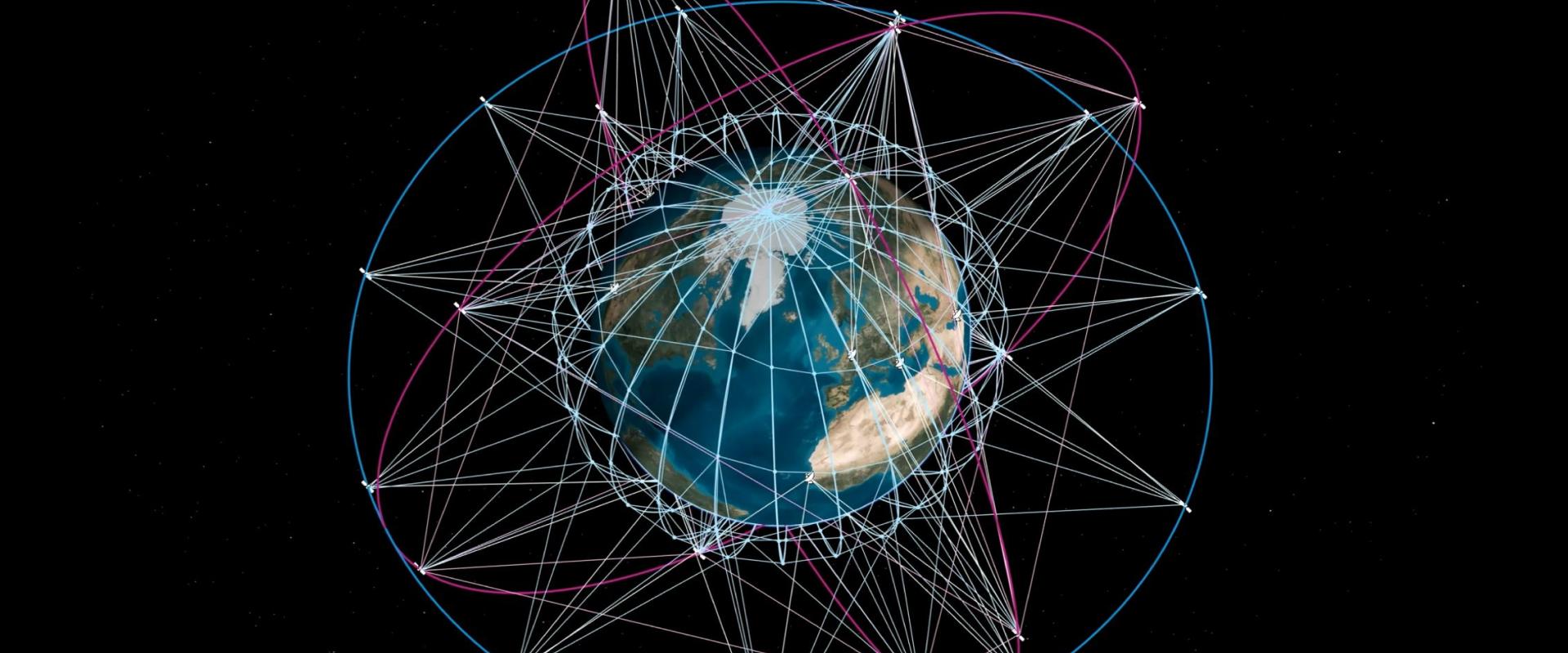by Christophe Bosquillon

IRIS2 (pronounced “iris square”) is the new EU secure satellite constellation project, which stands for Infrastructure for Resilience, Interconnectivity, and Security by Satellite. It is touted as “the European Union’s answer to pressing challenge of tomorrow, offering enhanced communication capacities to governmental users, businesses, while ensuring high-speed internet broadband to cope with connectivity dead zones.” IRIS2 is the result of a brilliant vision at the intersection of European “strategic autonomy,” orbital economy and policy, space industry majors, innovative start-ups, bureaucratic agendas, and a European Union space strategy for security and defence. Like many brilliant visions, it runs the risk of being eaten for breakfast by the tyranny of execution. Could it be different this time?
The genesis of IRIS2 dates to 2022, cast from the crucible of the Ukraine-Russia war. With impulse from European Commissioner for Industry and Space Thierry Breton, and support from President Macron, a political agreement was reached on 17 November 2022 between the European Parliament and EU Member States. That agreement on the Union Secure Connectivity Programme 2023-2027 with a budget of €2.4 billion, paved the way for final approval of the legal text by the European Parliament and the Council of the European Union. Acknowledging European economy and security are increasingly dependent on secure and resilient connectivity, politicians reckoned it was paramount for Europe to develop a sovereign, autonomous and secured connectivity infrastructure.
Orbital security is interlinked with terrestrial life.
It didn’t take too long for IRIS2 to ride along the European institutional agenda. By 30 March 2023’s “IRIS2 Industry Information Day”, it became explicit in the objectives, specifications, and governance framework of the program that both ESA and EUSPA had become part and parcel of its execution modus operandi: ESA, in accordance with its internal rules and IRIS² Regulation, may contribute through ESA optional programmes to the Programme’s development and validation activities resulting from the procurement. The Commission plans to entrust ESA with the supervision of the development and validation activities for the implementation of the IRIS² programme. ESA will place partnership project contracts with the entities awarded by the Commission. As for EUSPA, it is currently procuring the GOVSATCOM Hub infrastructure which will implement the operational interface between GOVSATCOM Hub and Hardgov services and Lightgov services users. The GOVSATCOM Hub will pool the existing satellite communication capacity and services made available by both the Contractor, private commercial and nationally owned operators.
The European Commission’s Fall 2022 rationale sounded fair and square: “After Galileo and Copernicus, we are adding a third constellation to our European portfolio of strategic space infrastructures”. What could possibly go wrong? While it has been suggested a few years back that a combination of GPS and Galileo could increase NATO’s resiliency in PNT (Positioning, Navigation, and Timing), in reality, it is still being seen as “nice to have, but not now.” As for Copernicus, after much ado, the UK is set to rejoin it together with the Horizon program, which is a positive. According to IRIS² Regulation, one of the objectives is to complement and integrate the existing and future capacity: let’s hope European “integration” will perform better this time around.
For the private sector, a key question remains though, on the sharing of the cake between industry majors and small businesses (SMEs). SMEs are supposed to represent a third of the program membership and be allocated a similar proportion of its value. But since there was only one bidding consortium for IRIS², the European Commission confirmed last week that it had selected the SpaceRise consortium. SpaceRise includes SES, Eutelsat, Airbus, and Hispasat, and expects to sign a contract on or before March 24th. France, which has a number of space start-ups, has committed additional funding estimated at €300 million under its “France 2030” Investment Plan for La French Tech. ESA funds the program to the tune of €644 million. However, the total cost of IRIS2 is estimated between €6 and €10 billion. Expectations from investment banks have been reported as positive regarding attractive financial returns for European satellite operators.
Let’s hope European “integration” will perform better this time around.
Orbital security is interlinked with terrestrial life and the survival of the economy. That aspect was explored by an ESA ECSECO “Space Economy Days” conference last week. While ECSECO investigated ways to more rigorously define the space economy and quantify its downstream markets, one of the presentations focused on the dire consequences for the UK economy of the loss of any global navigation satellite systems, a catastrophic event resulting most likely from a military conflict. IRIS2 which is all about secured and competitive connectivity, will be a crucial component of the European Union Space Strategy for Security and Defense. whose aim is to preserve both civilian and military space assets. In the same spirit, a CSIS event last week, “Tactically Responsive Space: A Holistic Approach reviewed rapid response options in the event of the sudden loss of critical space assets. A record is available here and this is a conversation we need to have in Europe as well.
Quantum key distribution (QKD), a tool to secure communications networks, will be a crucial component of IRIS2. Not to be left behind, the EU has commissioned a consortium named “Nostradamus” to build €16 million test infrastructure for QKD. The consortium is led by Deutsche Telekom and includes Thales and the Austrian Institute of Technology together with various partners. In the global technological “arms race” falling behind is everyone’s concern. Last week, the America’s Future Series’ “National Security Virtual Summit” reviewed the complex mix of building a space-driven industrial base, nurturing technological innovation, making sure that government and in particular defence play their role as anchor customers, while cohesively managing the return on investment constraints that drive private companies and venture capital investors decision-making. A record is available here and that too is a conversation we need to have in Europe.
It turns out that for the execution of the IRIS2 vision to prove fair and square, a number of elephants in the room will have to either magically disappear or, rather, be tackled. With the necessary political determination and economic development acumen. Not institutional self-replication and administrative agitation. Everyone else is running faster, and no one is waiting for Europe to make Europe work.
At the time of editing, the 16th European Space Conference is taking place on 23-24 January 2024 in Brussels. Encouraging updates regarding IRIS2 and the overall European context were provided. While that doesn’t change much the above analysis, further analyses will be provided in due time

Christophe Bosquillon has a diverse professional background, having operated globally with a focus on the Indo-Pacific region. His experiences in Japan, the Koreas, Taiwan, China, ASEAN, India, Russia, and Australia have given him a deep understanding of the multipolar realpolitik of our world under the Pax Americana. With a background in engineering, trade, and foreign direct investment in industries relevant to Space Resource Utilization (SRU), such as mining, transportation, energy, manufacturing, agrifood, environment, and digitalization, Chris is committed to developing SRU value chains that benefit the Earth. As an executive, owner, writer, and founder of Autonomous Space Futures Ltd, Chris has extensive experience in collaborative policy crafting and works to develop space business and governance models relevant to society. He is a member of NGOs that provide input to the United Nations Committee on the Peaceful Uses of Outer Space (UNCOPUOS) legal subcommittee Working Group on Space Resources. Chris contributes to regulatory clarity on appropriation, priority, sustainability, and sharing in a way that balances national interests with civil society inclusion, provided a transparent due process is followed. When advocating for access to technology and space for the Global South, Chris believes that emerging space powers’ participation in space markets must be commensurate with their interest and involvement in international space politics. He believes that their ability to develop sovereign domestic capabilities with spillover potential is also essential. Chris is keen on ‘Peace Through Strength’ diplomacy and deterrence-based security as enablers of secure space access. He supports sovereign cislunar space situational awareness as mandatory for freedom of circulation in the space domain and deconflicted cooperation on the Moon
 SpaceWatch.Global An independent perspective on space
SpaceWatch.Global An independent perspective on space




